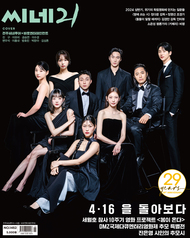칸영화제가 반쯤 끝나가는 일요일(5월15일) 밤 12시, 대부분의 사람들간에 의견이 일치되는 유일한 것은 올해 경쟁부문이 뛰어난 작품을 아직 못 내놨다는 것이다.
캐나다의 아톰 에고이얀과 데이비드 크로넨버그 감독, 오스트리아의 미카엘 하네케 감독 등과 같이 이름난 크루아제트 거리의 총아 여러 명은 뒤섞인 반응을 얻었고, 지금까지 가장 유력한 작품도- 미국 록스타 커트 코베인의 죽음에서 영감을 얻은 구스 반 산트의 <라스트 데이즈>- 누군가를 신나게 할 정도는 아니었다. 공식부문 작품 중에 가장 많은 사람들을 견해를 일치시킨 것은 우디 앨런의 첫 영국영화로, 런던을 배경으로 한 <매치 포인트>였다. 하지만 이 영화는 경쟁부문도 아니고 영국 평론가들은 질색하고 있다.
이 글을 읽을 때면 올해 영화제는 역사가 돼 있을 것이다. 앞으로의 5일 동안 여러 명의 유명 감독이 영화를 소개할 예정이지만- 예를 들어 라스 폰 트리에나 짐 자무시, 빔 벤더스, 허우샤오시엔 등- 칸영화제가 총애하는 작가들을 다시 불러 환영하는 올해의 안전제일 전략이 잘 통하지 않고 있다고 있다는 느낌이 점점 커지고 있다.
그렇지만 경쟁부문을 중심으로 한 온갖 소동과 기대를 떠나, 칸에서는 정말 흥미로운 일이 일어나긴 일어나고 있다. 특히 동아시아 출품작들 사이에서 그렇게 되고 있으며 특히 한국영화가 그렇다.
새로운 인재의 양성을 상대적으로 작은 영화제에 맡기면서, 감독들을 뒤늦게야 “발견”하는 칸은 자신의 후원에 의지하지 않은 영화업계들을 어떻게 다루어야 할지 항상 곤경에 빠져 있었다. 동아시아 중에서 일본, 대만, 중국, 심지어 자그마한 싱가포르 영화계조차도 칸이 옹호한 영화들로 국제적 정체성을 형성해왔다. 이들 영화는 서양 입맛에 맞춘 예술영화거나 “이국적인” 작품들로 의식하든 안 하든 유럽의 연출 스타일에서 영향을 받은 것이다.
그렇지만 올해 지금까지 치면 경쟁부문의 일본 출품작은 추락했고, 감독주간 부문을 열었던 싱가포르영화는 그저 프랑스 관객과 평론가들에게만 매력을 발휘하는 것 같다.
칸의 도움없이 국제적 정체성을 만들어나간 동아시아의 두 나라는 한국과 홍콩이다. 홍콩은 항상 칸의 문제거리였다. 관객을 즐겁게 해주는 홍콩 대중영화들은 보조적인 부문엔 괜찮지만, 정평있는 감독이 연출하지 않는 한 경쟁부문의 “진지한” 고려의 대상이 된 적은 거의 없었다. 올해 칸은 두기봉 감독의 <흑사회>를 경쟁부문에 포함시켜 말뿐인 호의를 베풀긴 했지만, <흑사회>는 경쟁부문의 유일한 아시아 장르영화로 선보이고 있다.
한국은- 프랑스의 지식층에 호소하는 홍상수 감독의 작품과 이국적 요소로 서구의 취향을 만족시킨 사극을 만들었지만 한국영화계의 주류라곤 할 수 없는 임권택 감독을 제외하고- 더더욱 큰 곤혹을 제공해왔다. 지난해, 칸은 경쟁부문에 <올드보이>를 선정하는 모험을 하긴 했지만 심사위원장이 쿠엔틴 타란티노 감독이 아니었다면, 이 영화의 빼어난 점들에도 불구하고 절대 상을 타지 못했을 것이다.
그러나 경쟁부문 밖에서는 사건들이 벌어지고 있다. 임상수 감독의 <그때 그 사람들>과 김지운 감독의 <달콤한 인생>이- 둘 다 안전한 영화가 아닌데- 대담함과 위험부담을 각오한 것이며 그들 자체만의 정체성에 대한 절대적 자신감 덕에 호응을 얻었다.
올해 칸영화제는 한국영화에 중요한데, 영화제와 마켓에 참여한 작품수가 이례적으로 많기 때문이 아니라 칸의 “공식적” 인정 없이도 한국영화가 계속적으로 전진하고 있다는 사실을 보여줬기 때문이다. 임권택 감독이 한국 영화계를 공인해주는 나날은 끝났다. 한국영화계의 미래는 이제 확실히 (칸이 아니라- 편집자) 스스로에게 달려있는 것이다.
It's midnight in Cannes, halfway through the festival, and the only thing that most people are agreed on is that this year's Competition has yet to produce a standout movie.
Several big-name Croisette favorites, such as Canada's Atom Egoyan and David Cronenberg, and Austria's Michael Haneke, have received mixed reactions, and even the favorite so far - Gus Van Sant's "Last Days," inspired by the death of American rock star Kurt Cobain - has no one doing cartwheels. The only film in the Official Selection that has united most people is Woody's Allen's first British movie, the London-set "Match Point" - though it's not in the Competition and British critics hate it.
By the time you read this, this year's festival will be history. But although several big names are still to present their movies in the next five days - such as Lars Von Trier, Jim Jarmusch, Wim Wenders, Hou Hsiao-hsien - there's a growing feeling that Cannes' play-safe strategy this year of welcoming back its favorite auteurs is not really working.
But away from all the hoopla and expectation centred on the Competition, something very interesting IS happening at Cannes - most notably among the East Asian entries, and especially South Korean cinema.
As a festival that tends to leave the nurturing of new talents to smaller festivals, and only "discover" filmmakers late in the day, Cannes has always been in a quandary about how to handle film industries that have not relied on its own patronage. Among East Asian industries, Japan, Taiwan, China and even tiny Singapore have had their international identities shaped by films that Cannes has championed: arty or "exotic" fare that caters to western tastes and is often, consciously or not, influenced by European film-making styles.
But so far this year, the Japanese entry in Competition has crashed, and the Singaporean movie which opened Directors' Fortnight seems to appeal only to French audiences and critics.
The two East Asian industries that have forged international identities without help from Cannes are South Korea and Hong Kong. Hong Kong has always been a problem for Cannes: its crowd-pleasers have been deemed fine for sidebars but rarely worthy of "serious" consideration in Competition, unless directed by an established name. This year the festival has paid lip-service to the territory by including Johnnie To's Triad drama "Election" in Competition; but it stands naked and alone as the only Asian genre movie there.
South Korea - with the exception of Hong Sang-soo, whose films appeal to France's intelligentsia, and the unrepresentative Im Kwon-taek, whose costume dramas satisfied western tastes for the exotic - has been even more of a problem. Last year, Cannes took a chance by selecting "Old Boy" for Competition, but without Quentin Tarantino as chairman of the jury, it would never have won a prize, despite its merits.
But outside the Competition, things have been happening. Both Im Sang-soo's "The President's Last Bang" and Kim Jee-woon's "A Bittersweet Life" - neither of them safe movies - have been well received, for their boldness, risk-taking and absolute confidence in their own identity.
This year's Cannes is an important one for South Korean cinema, not because of the unparalleled number of its movies in both the festival and the Market but because it's shown that it is continuing to move ahead without "official" recognition. The days of Im Kwon-taek validating the industry are over; the future of South Korean cinema is now firmly its own hands.





